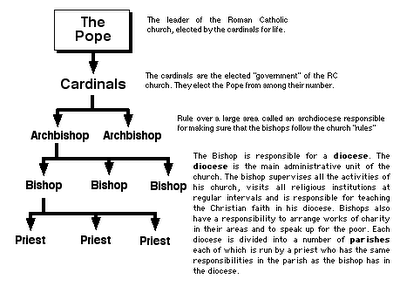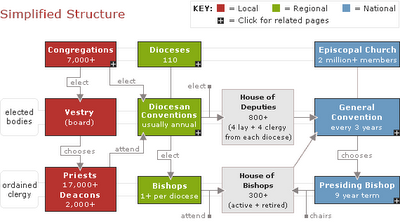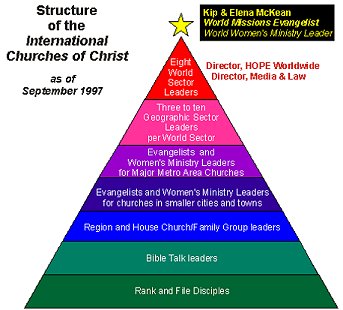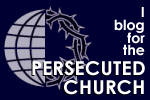Church Governance



Question:
Do some first-hand research on different forms of church governance. You may want to interview a minister, priest, or lay-member from a Christian tradition different from yours—Protestant, Orthodox, or Catholic. How do you understand authority in the church? Where does authority reside to decide between conflicting understandings of Scripture or theology? What would be the advantages and disadvantages of being ruled by a bishop who is empowered to make a final decision? Compare this to a congregational or representative form of government. What can you learn from this different perspective that will enhance your appreciation for the variety of ways that the church governs itself?
I recently attended an Episcopal Church and talked with the priest. He was Anglican and was now in charge in an Episcopal church. One striking difference was that this was a "Protestant" church but still provided a communion and a Sunday "Eucharist". I asked the priest about this and he told me that since he was an ordained Angelican priest he could claim Apostolic succession. Since he could claim Apostolic succession, he could properly and rightfully provide the "Eucharist". Since I attended Roman Catholic high school (I am non-denominational) I knew that even this supposed close tie to Apostolic succession was not recognized in the Roman Catholic Church. As far as my education went, when England split from Rome, all Apostolic succession ended when that split occurred and thus all other churches and denominations were "anathema" or not recognized. A bishop still approves decision in this denomination and thus still tries to follow the succession of the Roman Catholic and Orthodox church. It was interesting that titles were more important than what was taught through sermons or bible study. To me the authority resides in the Holy Spirit and those who obviously have the Spirit and teach through Scripture. Authority seems to reside in the top hierarchy of the particular denomination such as Episcopal, and individual priest do not have the ability to teach as the Spirit shows them but only as the the governing councils have agreed to. The advantages of such a form of governance is that off the wall and "unorthodox" biblical teaching would be eliminated and that the sermons stayed the same as they have for hundred of years. The disadvantages included the inability to grow with changing times and a type of close mindedness when it came to biblical exegesis. This form of governance is like a pyramid and is a popular business management model that is still in use today. The pope or bishop is at the top and like a triangle or pyramid, all lower levels of management are influenced and in the control of the levels above them. In college, we used to use the Roman Catholic church as an effective management hierarchy because something works well if it has worked for 2000 years. However, that is not how the Holy Spirit works...it may work well as a business management model but my experience proves that the Spirit cannot be confined to a "model". What I can learn from this perspective is that even a Protestant denomination like the Anglican and Episcopal churches, find the Apostolic succession to be very important and crucial in church authority and doctrine.
Labels: Christian History, Early Church History, Seminary

















0 Comments:
Post a Comment
Links to this post:
Create a Link
<< Home